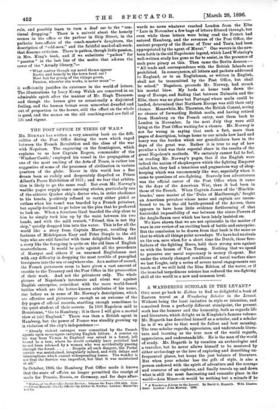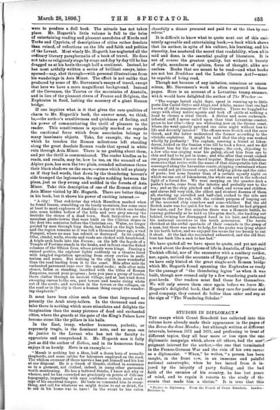A WANDERING SCHOLAR IN THE LEVANT.* ONE must go back
to Eothen to find so delightful a book of Eastern travel as A Wandering Scholar in the Levant. Without being the least imitative in style or intention, and conceived from a perfectly different standpoint, the present work has the humour and the humanity, both as regards life and literature, which delight us in Kinglake's famous volume. Mr. Hogarth has described himself as a scholar, and a scholar he is if we give to that word its fullest and best meaning. The true scholar regards, appreciates, and understands litera- ture and learning as the true man of the world regards, appreciates, and understands life. He is the man of the world of study. Mr. Hogarth is by vocation an archmologist and a traveller, but he never allows himself to be mastered by either archmology or the love of exploring and describing un- frequented places, but keeps the just balance of literature. But when your scholar has the gift of style, is also a person endowed with the spirit of adventure and the courage and resource of an explorer, and finally travels up and down what is still the most fascinating and romantic place in the world—Asia Minor—it would be nothing but a miracle if he • A Wanderiss Scholar in the Levant. By David G. Hogarth. With Matra tione. London : John Murray. 1.896.
were to produce a dull book. The miracle has not taken place. Mr. Hogarth's little volume is full to the brim of entertaining reading and pleasant anecdotes of Kurds and Turks and Cypriots, of descriptions of cities rather desolate than ruined, of reflections on the life and faith and politics of the Levant. Most wisely Mr. Hogarth has neglected all the ordinary literary paraphernalia of a book of travel. He does not take us religiously stage by stage and day by day till he has dragged us at his heels through half a continent. Instead, he has most artfully written a series of brilliant essays, inter- spersed—nay, shot through—with personal illustrations from his wanderings in Asia Minor. The effect is not unlike that produced by some of Mr. Stevenson's essays of travel, except that here we have a more magnificent background. Instead of the Cevennes, the Taurus or the mountains of Anatolia, and in lieu of the pleasant rivers of France and Belgium, the Euphrates in flood, lashing the masonry of a giant Roman bridge.
If one inquires what is it that gives the rare qualities of charm to Mr. Hogarth's book, the answer must, we think, be,—the author's sensitiveness and quickness of feeling, and his power of communicating the thrill of pleasure to the reader. This sensitiveness is specially marked as regards the emotional force which from association belongs to many inanimate objects. Take, for example, the way in which he touches the Roman milestones left standing along the great desolate Roman roads that spread in white ruin through Asia Minor. There is no gushing about them, and yet the thrill is communicated. The reader kindles as he reads, and recalls, may be, how he too, on the summit of an Alpine pass, has seen the two plain, rounded milestones throw their black shadows on the snow,—stones which tell as plainly as if they had words, that down by the thundering torrent's side tramped the legionaries, the eagles nodding between the pines, just as they swung and nodded in the forests of Asia Minor. Take this description of one of the Roman cities of Asia Minor visited by Mr. Hogarth. There are better things in his book, but it shows his power of exciting interest :—
" A city ! That red-letter day which Hamilton marked when he found Isaura, crumbling on its lonely mountain, has come once at least to most explorers of Anatolia—a day on which one breaks into some hidden hollow of the hills and sees grey among the lentisks the stones of a dead town. Such fairy-cities are the nameless pirate-towns that were built on the Cilician slopes in the first two centuries before the Christian era. Water, no longer guided by man through long ducts, has failed on the high lands, and the region remains as it was left a thousand years ago, a vast Pompeii, where no man has rebuilt or destroyed. In its capital, Olba, citadel, walls, streets and roads are choked with brushwood. A hiple arch leads into the Forum ; on the left the façade of a. Temple of Fortune stands in the brake, and in front rise the fluted columns of the Olbian Zeus, whose priests were kings. Passing a ruined portico, the explorer lights suddenly on a theatre lined with tangled vegetation sprouting from every crevice in audi- torium and scene. But nothing in the city is more wonderful than the road leading from it to the coast. Mile after mile its embanked pavement runs over the naked rocks ; mile after mile stones, fallen or standing, inscribed with the titles of Roman Emperors, record your ptogress ; here you pass a group of tombs, there clatter through an ancient village, and at last wind down sweeping curves to the sea, past towers and tombs rising white out of the scrub ; and nowhere in the towers or the villages, on the road or in the city is there a human thing except the wander- ing shepherds."
It must have been cities such as these that impressed so potently the Arab story-tellers. In the thousand and one tales there is nothing which more stimulates and delights the imagination than the many pictures of dead and enchanted cities, where the guards at the gate of the King's Palace have become stone like the pillars in his halls.
In the East, irony, whether humorous, pathetic, or supremely tragic, is the dominant note, and no man can do justice to the Levant who has not the faculty to appreciate and comprehend it. Mr. Hogarth sees it fully just as did the author of Eothen, and in its humorous form enjoys it as keenly. Here is an example :— "Marsh is nothing but a khan, half a dozen huts of nomadic shepherds, and some cabins for labourers employed on the road. The whilom overseer of these navvies has put himself and his hut at our disposal. He is a Greek of Greeks, clothed in assurance as in a garment, not clothed, indeed, in many other garments worth mentioning. He has a tattered Strabo, I know not why or whence, and he has corrected me graciously on points of Cilieian topography, imparting with easy confidence certain novel read- ings of his ancestral tongue. He bade us command him in every- thing, and call for whatever we might desire to eat or drink, for to ask in his house was to have ! In the event be has eaten. cheerfully a dinner procured and paid for at the than by our- selves."
It is difficult to know what to quote next out of this emi- nently agreeable and entertaining book,—a book which shows that its author, in spite of his culture, his learning, and his sincerity, has mastered the secret that readability, when all is said and done, is the essential quality of literature. It is not of course the greatest quality, but without it beauty of style, soundness of opinion, force of thought, alike are useless. Books that are meant to be read—and what books are not but Bradshaw and the Lands Clauses Act?—must be capable of being read.
Though not because of any imitation, conscious or uncon scions, Mr. Stevenson's work is often suggested in these pages. Here is an account of a Levantine tramp steamer, vaiih would have delighted the author of The Wrecker :—
" The voyage lasted eight days, spent in running up to little ports like Castel Orgzo and Alaya and Adalia, names that one had known of old in romances of the Crusades. There we haggled for cargo with slimy native agents and took off cattle at nothing a head to ehouse a rival Greek. A dirtier and more cockroach- infested craft I never sailed upon than that Levantine coaster, peace to her ribs !—they are whitening now on the Syrian coast, where she went quietly aground one calm night without loss to life and decently insured ! The officers were Scotch and the crew Greek, and the latter understood the former according to the vitriolic expletives. It might be said that the ship was worked wholly by profanity ! The captain, meeting a friend at Isken- derun, looked on the Samian wine till he took a fever, and we did without him for the rest of the voyage; the cook, objecting to. a Jew who was singing near his galley, sliced him from eye to chin and had to be put in irons ; and who after that event cooked our greasy dinner I never dared inquire. Many are the ridiculous memories that revive with the name of that disreputable tub that scavenged along the Levantine coasts, shipping contraband where she could not get licensed cargo, and defying pilots and the rules of ports; but none funnier than of a certain squally night on which we ran out of Iskenderun, the whole sea red in the reflected light of a forest fire. We were carrying on the quarter deck a pasha's harem, come from the interior and probably new to the sea ; and as the ship pitched and rolled, and wives and children and slaves fell very sick, the oldest and stoutest duenna of thema all, starting up unveiled and half-clad, rushed to the side and began to climb the rail, with the evident purpose of leaping out of the accursed ship somehow and some-whither But the old Scotch mate was too quick for her : in an instant he had gripped her waist, and for five minutes there was a Homeric battle, he cursing gutterally as he held on like grim death, she hacking out behind, twining her disengaged hand in his hair, and defaming his maternal ancestors to the tenth generation. The harem shrieked at the awful spectacle of their comrade in the grasp of a man, but there was none to help, for the pasha was lying abject in his berth below, and we enjoyed the scene far too keenly to cut it short. At the last she succumbed exhausted, and the old Scot bore her back like a sack to her bed."
We have quoted all we have space to quote, and yet not said a word about the descriptions of life in Anatolia, of the typical Turkish official, nor of the encounter with a sanitary cordon, nor, again, noticed the accounts of Egypt or Cyprus. Lastly, we have only hinted at the great single-arch Roman bridge which Mr. Hogarth found spanning the Euphrates as ready for the passage of "the thundering legion" as when it was built, though now crossed only by a few wandering goats and goat-herds. Our readers must find these for themselves. We will only assure them once again before we leave Mr_ Hogarth's delightful book, that if they care for pastime and good company, they cannot do better than enter and sup at the sign of "The Wandering Scholar."







































 Previous page
Previous page